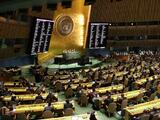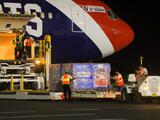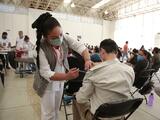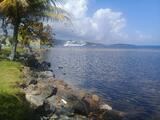Nicaraguan government ignores coronavirus and prepares for large Easter celebrations, without church
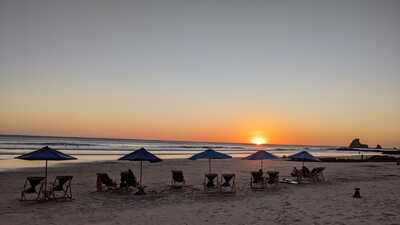
Seated outside her home after sundown in downtown San Juan del Sur, Maria Lopez watched as tourists rambled across the street, hopping from bar to bar.
“Such vagrancy,” the spry octogenarian called it. The scene – carefree enjoyment unencumbered by hand sanitizer or social distancing – was a stark contrast to that playing out in neighboring countries where the spread of coronavirus has led to closed borders and locked down cities.
"What are we gloing to do?"
“If it arrives, then it arrives, what are we going to do?” said Lopez, referring to the pandemic with the deadpan manner of a person who’s lived through a crisis or two. “If I run, then it’ll get me, and if don’t run, it’ll get me too," he added.
The attitude taken by Lopez was reflective of that taken by the Nicaraguan government, which to the consternation of many has refused to take preventative measures against the looming threat even as it encircled the country.
Within the hour, however, the vice president of Nicaragua, Rosario Murillo, announced that it had indeed arrived, confirming the country’s first case of the dreaded virus while stressing that it had been “imported” by a man who’d traveled abroad.
The next morning, several restaurants shuttered, tourists scrambled to find their way out and an elderly woman wearing a mask and walking the quieter-than-normal streets scolded her husband for touching a light pole with bare hands.
But the government’s refusal to take action remained steadfast.
“It’s evident that there isn’t a commitment, that there is no concern for the citizens, the value of human life or the right to health,” said Carlos Fernando Chamorro, editor of the independent news outlet Confidencial in Managua. “By not having taken preventative measures that are truly effective a month ago, two weeks ago or today, we don’t know might happen in the weeks and months ahead.”
What are other countries doing?
The rest of Central America has taken decisive action against the threat. El Salvador – which confirmed its first case on the same day as Nicaragua – closed its borders even before coronavirus was confirmed in the country. The rest of the region followed suit or took even more drastic measures, such as in Honduras, where several of the country’s largest cities are on complete lock down.
The obvious contrast has left many fearing the worst.
“[The government] needed to prevent it since before like El Salvador,” said Jeffrey Hernandez, 29, as he sat out front his fishing tour business waiting for customers that might not come not just for days, but months. “If they had closed the borders before maybe this wouldn’t have happened. It would have affected us, but at least we wouldn’t have the virus.”
If business doesn’t return then Hernandez might have to sell fish, instead of fishing tours, to support his three children. “But who’s going to want to buy fish,” he said, fearful that it might become a luxury in tough economic times.
Economic cost
While the rest of Central America has experienced steady growth in recent years, Nicaragua’s economy has been in recession ever since April 2018 when President Daniel Ortega responded to protests with brutal repression that left more than 300 dead. The majority of the protests were far from San Juan del Sur, which at the time was an emerging hotspot for tourists, particularly surfers who come for the steady waves and secluded beaches.
But the economic effect hit as hard in this oceanside town, located on the pacific coast near the border with Costa Rica, as anywhere else when the tourism industry lost half of its revenue.
“Nothing happened here like in other places, but we felt it,” said Francis Cruz, 60, as she sat in a rocking chair keeping watch over her daughter’s tourism business. This crisis could be much worse than the last one, said Cruz. As soon as the first case was confirmed in the country, cancellations started pouring in.
“Since yesterday everything collapsed completely," said Cruz.
Tourists – who the day before were taking shots and toasting to coronavirus – were fleeing for the exits out of fear that the country might soon change its course and take the drastic measures seen across the region. An American couple, who asked not to be named out of privacy concerns, booked the first flight out they could find, cutting their vacation short by several weeks.
The decision was in line with the U.S. State Department’s raising of the global travel warning to level 4, which urged Americans abroad to come home as soon as possible.
The most affected by the economic downturn will be the poor who live day-to-day and form part of the over 70 percent of the population that works in the informal sector.
Alongside the beach, the worry among street vendors of artisan crafts and cashew nuts was as palpable as the breeze coming off the ocean.
“This is going to affect us a lot if we can’t work,” said Nestor Diaz, 31. “In the crisis tourists still arrived but now no one is coming.”
Information scarce
The lack of information coming out of the government increases his concern.
“The government hasn’t said anything,” he said before drawing a contrast with what he’s seen in the news from the rest of the region. While other presidents have provided regular updates to their populations on the spread of the virus, Ortega has yet to even mention it.
Meanwhile, in the capital Managua, the quiet hoarding of hand sanitizer and masks that had gone on for weeks turned into lines running out the door at several supermarkets. By the next day, however, the lines had diminished. Still, there were plenty of signs of growing concern.
Masks and gloves appeared on people working in customer service. Banks limited the number of persons inside at a time. Restaurants cordoned off tables to keep customers at a distance.
Locals find solace in the fact that they’ll be covered by the country’s universal health system. But the government has continued to condone – and outright encourage – mass gatherings.
All public schools have been ordered to remain open and promotions continue for Holy Week activities despite the Catholic Church cancelling its own. Such intransigence could lead to the health system becoming quickly overwhelmed.
In the absence of government leadership on the issue, civil society, businesses and religious organizations have attempted to fill the void. While all public schools remain open, many private schools and universities have closed. Days after the government announced around 80 events for the coming Holy Week, the Catholic Church canceled its own.
For Chamorro, the government’s intransigence likely owes to a fear of harming the economy and reducing the tax revenues that sustain the government. In the end, depending on how the virus develops in the country, the political impact of the government’s handling of the crisis could have the highest toll for Ortega’s regime.
“The indolence of the government could broaden the national base of protest and rejection of this government because everyone is seeing the way in which they are failing to appreciate the right to health and human life,” said Chamorro. “Sectors of the population that perhaps have been on the sidelines will find a motivation to press for an exit of this dictatorship, because if not we are all going to sink," he added.
On Friday evening, Murillo announced the confirmation of a second case of coronavirus.
